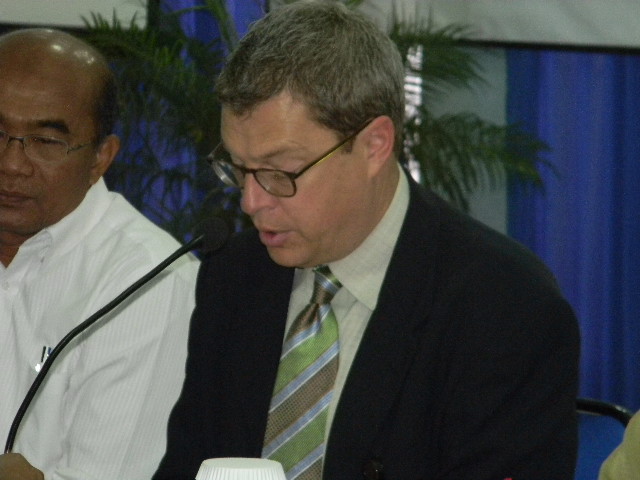Scharffs at Indonesian Conference on Shari’a and Human Rights, 13-16 June 2011

Professor Brett Scharffs, Francis R. Kirkham Professor of Law at the J. Reuben Clark Law School and Associate Director of the International Center for Law and Religion Studies at BYU, participated in an Expert Conference on the Master Level Course on Shari’a and Human Rights: Background and Core Issues in Contemporary Indonesia, held at the University of Muhammadiyah in Malang, Indonesia on June 13-16, 2011. This was the latest in a series of conferences held in Indonesia designed to discuss the relationship between Islamic law and human rights, and to help lay the groundwork for designing a high-quality master-level course suitable for teaching at Islamic universities in Indonesia about the intersections, harmonies and conflicts that arise between Shari’a and human rights, particularly in the Indonesian context.
The conference was sponsored by the Centre for the Study of Religion and Multiculturalism (PUSAM), a postgraduate program at the University of Muhammadiyah Malang (UMM), one of the leading private Islamic universities in Indonesia. It was co-organized by the Oslo Coalition and the Norwegian Centre for Human Rights (NCHR), University of Oslo, Norway, in cooperation with the International Center for Law and Religion Studies at BYU.
Foreign participants at the conference included leading experts in both international human rights and Islamic law, including Dr. Mohammad Hashim Kamali, President and CEO of the Institute for Advanced Islamic Studies in Kuala Lumpur, Malaysia, Dr. Lena Larsen, Programme Director of the Oslo Coalition of the Norwegian Centre for Human Rights, Dr. Tore Lindholm, professor of philosophy at the University of Oslo and member of the Oslo Coalition, Dr. Abdu Saeed, professor of Islamic studies at the University of Melbourne, Professor Scharffs, and Aksel Tomte, representing the Indonesia program of the Oslo Coalition/Norwegian Center for Human Rights.
More than forty professors from Indonesia representing fields including Islamic studies, law, human rights, sociology and history participated in the conference, including Professor Syamsul Arafin, Univeristy of Muhammadyah Malang (UMM), who chaired the organizing committee. Papers were presented by Professor Hafid Abbas, National University of Jakarta, Professor Amin Abdullah, professor of Islamic studies, Islamic University of Yogykarta (UINJ), Professor Musdah Mulia, Islamic University of Jakarta (UIN Jakarta), and Professor M. Latief Fauzi, Indonesian Islamic University (UII).
Professor Scharffs presented a paper, “Challenges to Effective Protection of Freedom of Religion or Belief in Highly Diverse Settings,” which outlined a range of social attitudes towards religion that might prevail in a society, the types of public policies and legal mechanisms for regulating law that typically follow from those attitudes, and the distortions and challenges that arise at each of these point along the spectrum of attitudes and policies. He then suggested specific strategies for mitigating the problems that arise that are helpful in effectively protecting freedom of religion and belief, including:
• recognizing the value and positive social effects of pluralism,
• creating presumptions for freedom within a human rights framework and imposing limitations upon religious freedom only when genuinely necessary,
• focusing upon ways in which the needs and interests of local religious majorities as well as minorities can be recognized and respected,
• recognizing that in a global world everyone is a religious minority and understanding the benefits that flow from adopting policies that genuinely reflect the experience of religious minorities within our societies,
• having attitudes towards religious change that view it not as an act of treason or rebellion, but a normal aspect of human moral agency, freedom and dignity,
• utilizing ordinary laws to deal with issues that arise from religious extremism, rather than targeting religion, and
• adopting policies and attitudes that reflect the Golden Rule (which is common in nearly every religion and non-religious philosophical tradition), and engaging in constructive dialogue where each of us holds ourselves accountable to act in a way that is consistent with our own professed beliefs.
The conference was opened by Dr. Latipun, Director of Postgraduate Studies at the University of Muhammadiyah Malang, and Dr. Mutiadjir Effendy, Rector of the University of Muhammadiyah Malang.
Professor Scharffs also gave a welcoming address in which he discussed the history of the drafting of the Universal Declaration of Human Rights, including numerous specific contributions of delegates from Western as well as non-Western countries, including Carlos Romulo of the Philippines, who was not deterred by his “supposed” inferior status and described his persistence as becoming a “nuisance, a gadfly, a pest. I prowled corridors, buttonholed delegates, cornered unwilling victims in hotel lobbies and men’s rooms.”
Scharffs particularly noted the contributions of the Chinese Delegate, P.C. Chang, who suggested the insertion of the Chinese concept ren, to compliment reason in Article one of the UDHR, which states, that all human beings are “endowed with reason and conscience (ren) and should act towards one another in a spirit of brotherhood.” Scharffs noted that it is unfortunate that ren, which in Chinese literally means two-man-mindedness, and can be understood as empathy, sympathy, consciousness of one’s fellow men, or compassion, was translated as “conscience,” not because conscience is unimportant, but because it, like reason, is an inward-looking human capacity, whereas ren captures the other-regarding human capacity that is equally fundamental to being human.
Translating ren correctly, Scharffs suggested, could impact the way we think about human rights in numerous ways, including that it would mean that the other, including religious minorities, would always be kept in mind as policies are formulated and implemented. Second, it would emphasize that when we think and speak of human rights, we must also speak and think in terms of human, relational duties – not just the duties that you owe me when I have a right, but the duties that I have that accompany my having a right.
The conference ended with a discussion of the objectives and curriculum of the proposed master level course on Shari’a and Human Rights, and a plan to begin teaching the course on a trial basis at the University of Muhammadiyah Malang in 2012.